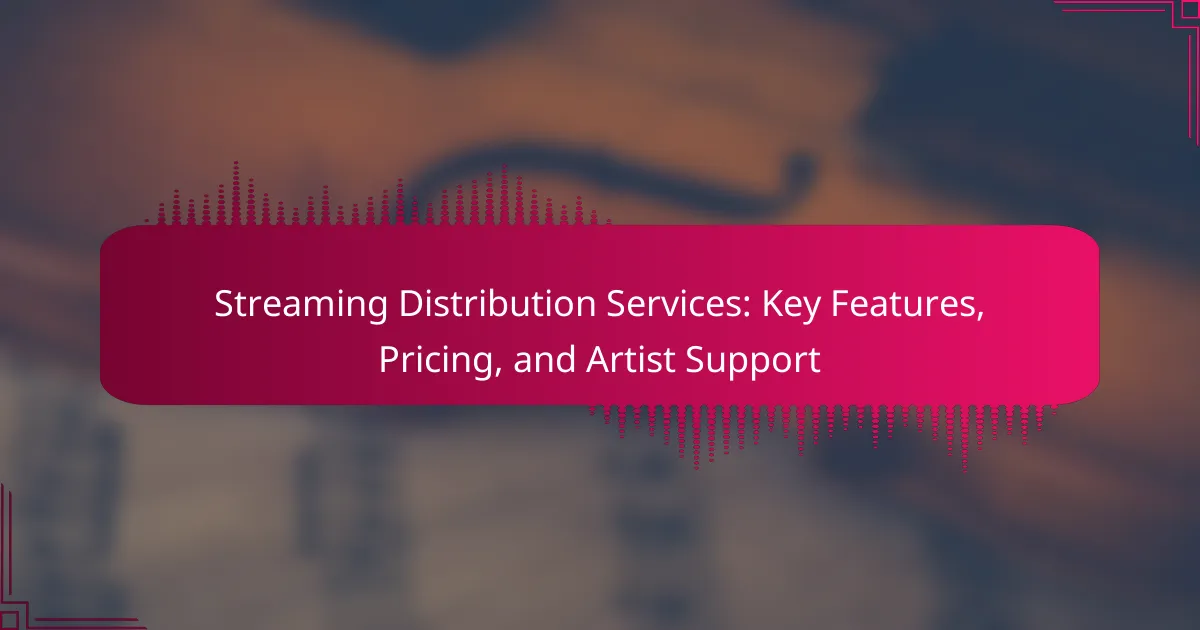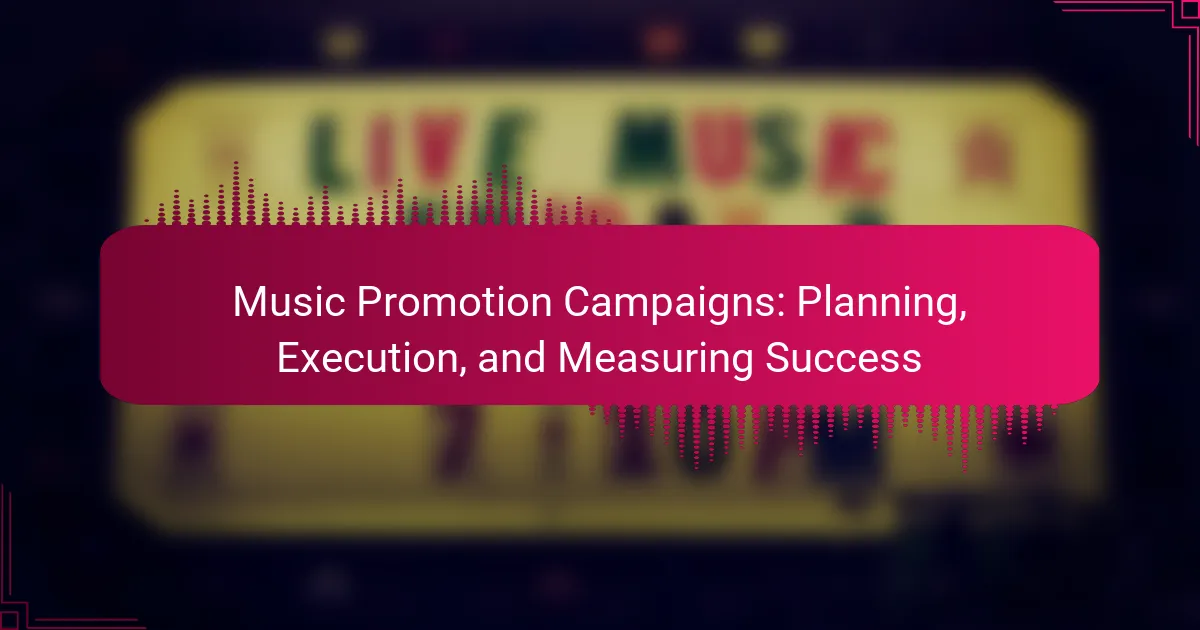Independent record labels provide unique opportunities for artists seeking creative freedom and personalized development. They support niche markets and foster close relationships between artists and labels. This article explores the role of independent labels, their benefits, and effective approaches for artists to connect with them. Additionally, it addresses the challenges these labels face in a competitive industry.
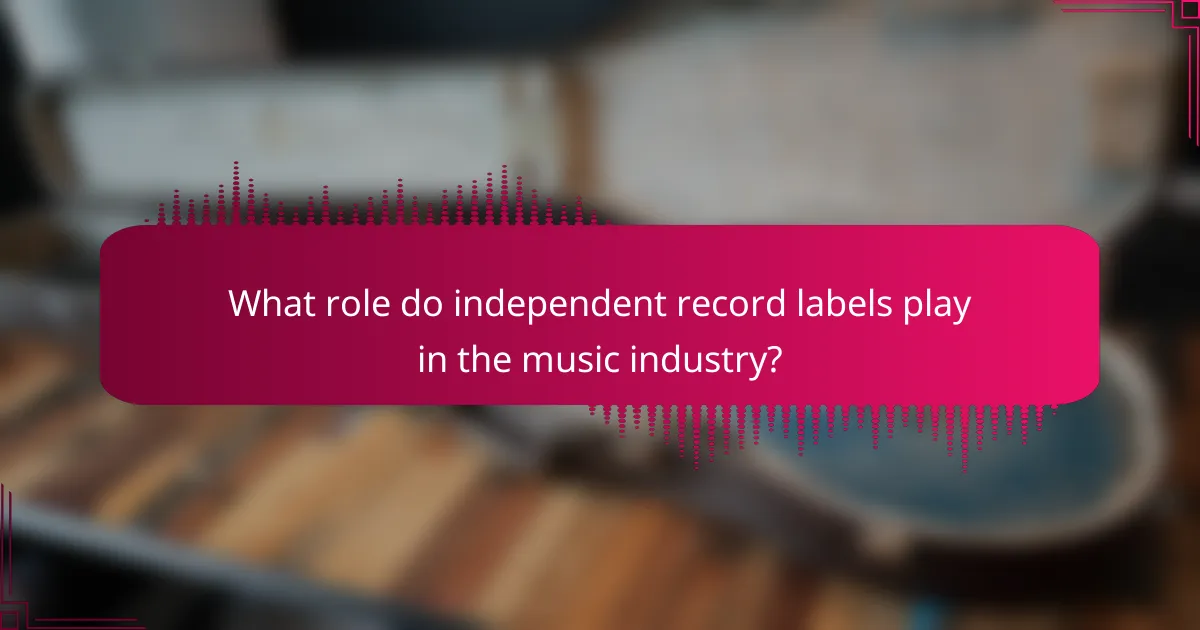
What role do independent record labels play in the music industry?
Independent record labels play a crucial role in the music industry by fostering creativity and supporting emerging artists. They provide opportunities for unique musical expressions that major labels may overlook. Independent labels often focus on niche markets, allowing diverse genres to flourish. Additionally, they offer personalized marketing strategies and closer artist-label relationships, enhancing artist development. This approach can lead to innovative sounds and a more vibrant music scene overall.
How do independent record labels differ from major labels?
Independent record labels prioritise artistic freedom and niche markets, while major labels focus on mass appeal and commercial success. Independent labels often offer personalized support and flexible contracts, allowing artists to maintain creative control. In contrast, major labels provide extensive resources and marketing reach but may impose stricter guidelines. This fundamental difference shapes the artist’s experience and opportunities within the music industry.
What impact do independent record labels have on emerging artists?
Independent record labels significantly impact emerging artists by providing essential support and resources. They offer creative freedom, personalized marketing strategies, and financial backing, which are crucial for artists’ growth. Independent labels often prioritise artist development over commercial success, allowing for unique sounds and innovative projects. This nurturing environment helps artists build their brand and connect with audiences authentically.
Why are independent labels crucial for music diversity?
Independent labels are crucial for music diversity because they promote unique sounds and underrepresented artists. They provide creative freedom, allowing musicians to explore innovative styles without commercial constraints. Independent labels often discover and nurture talent that mainstream labels overlook, enriching the music landscape. This diversity leads to a broader range of genres and influences, fostering a more vibrant cultural exchange within the industry.
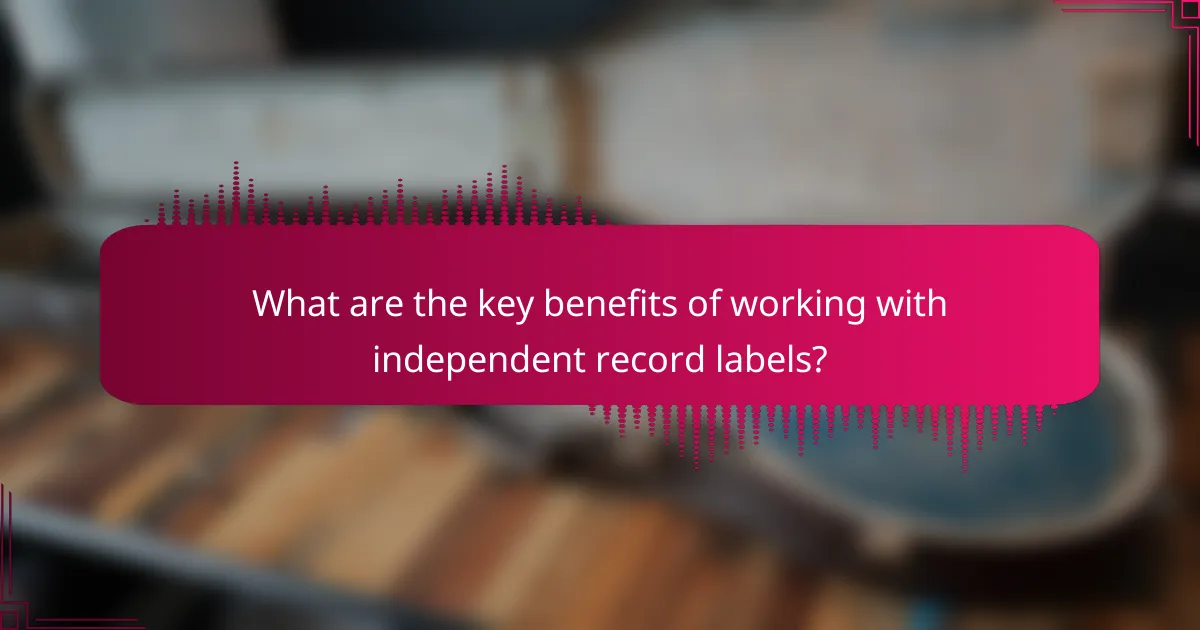
What are the key benefits of working with independent record labels?
Independent record labels offer several key benefits, including creative freedom, personalized artist development, and a stronger connection to niche audiences. They often provide more direct financial support and better revenue sharing compared to major labels. Independent labels typically prioritise artistic integrity, allowing artists to explore unique sounds and concepts without commercial pressure. Additionally, they can foster close-knit communities, enhancing collaboration and networking opportunities for emerging musicians.
How do independent labels foster artist creativity?
Independent labels significantly enhance artist creativity by providing freedom and personalized support. They prioritise artistic vision over commercial pressures, allowing artists to explore their unique sound. This independence fosters innovation, resulting in diverse music that resonates with audiences. Independent labels often offer tailored resources, mentorship, and a collaborative environment, further nurturing creativity.
What financial advantages can independent labels provide?
Independent labels offer financial advantages such as higher revenue shares, lower overhead costs, and flexible funding options. Artists typically retain more control over their earnings, allowing for better profit margins. Additionally, independent labels often provide tailored marketing strategies that can lead to increased visibility without the hefty financial commitments of major labels. These factors contribute to a more artist-friendly financial landscape in the music industry.
How do independent labels enhance marketing opportunities?
Independent labels enhance marketing opportunities by providing artists with personalized strategies and niche audience access. They often utilise innovative promotional methods that larger labels may overlook. This tailored approach can lead to more authentic fan engagement and increased visibility in specific music genres. Independent labels also tend to have stronger connections within local music scenes, facilitating grassroots marketing efforts.
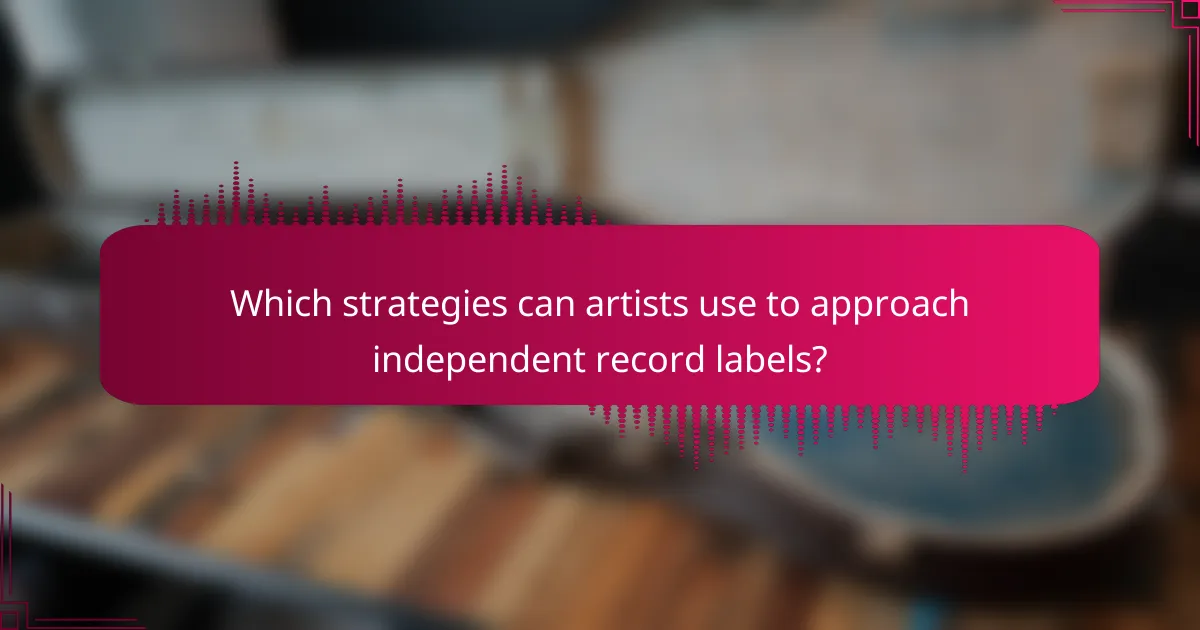
Which strategies can artists use to approach independent record labels?
Artists can approach independent record labels by networking, showcasing their work, and understanding the label’s vision. Building relationships through live performances or social media can create opportunities. Artists should also prepare a professional demo that highlights their unique sound and style, aligning with the label’s focus. Researching the label’s roster helps tailor pitches effectively. Lastly, being persistent while remaining open to feedback can enhance chances of collaboration.
What materials should artists prepare before reaching out?
Artists should prepare a professional demo, a press kit, and a clear artist statement before reaching out to independent record labels. A demo showcases musical talent and style, while a press kit includes biography, photos, and reviews. An artist statement articulates the artist’s vision and goals.
How can artists effectively pitch to independent labels?
Artists can effectively pitch to independent labels by crafting personalized, concise proposals that highlight their unique sound and vision. Focus on building a genuine connection with the label by researching their roster and aligning your music with their ethos. Demonstrating professional quality in recordings and presentations is essential, as is showcasing a strong online presence and audience engagement. Tailor your approach to each label, emphasizing how your work can contribute to their brand.
What common mistakes should artists avoid when contacting labels?
Artists should avoid common mistakes like sending generic messages, not researching the label, and failing to showcase their unique sound. Personalising communication is crucial for making a strong impression. Highlighting relevant achievements and understanding the label’s focus can significantly improve chances of a positive response.
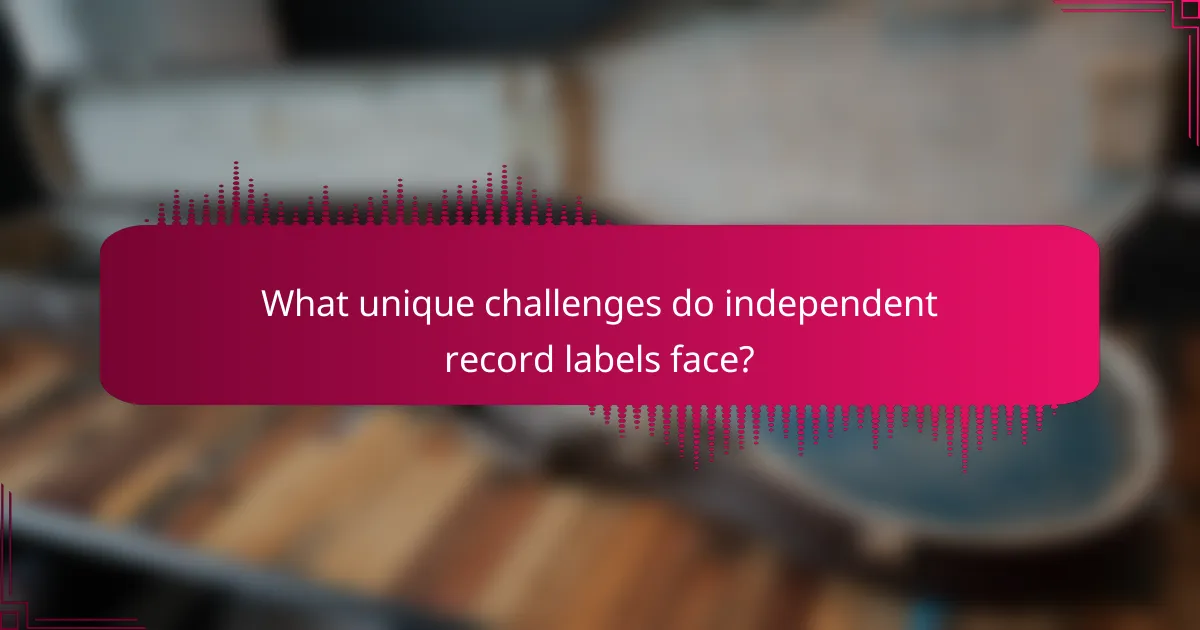
What unique challenges do independent record labels face?
Independent record labels face unique challenges such as limited financial resources, competition from major labels, and difficulties in marketing. These factors hinder their ability to promote artists effectively. Additionally, they often struggle with distribution and access to industry connections, which are crucial for growth.
How do limited resources impact independent labels?
Limited resources significantly hinder independent labels by restricting their ability to promote artists effectively. Financial constraints limit marketing efforts, production quality, and distribution channels. As a result, these labels often struggle to compete with major labels that have more substantial budgets. Additionally, limited resources can affect talent acquisition and retention, leading to fewer opportunities for artists to thrive. This creates a challenging environment where innovation may be stifled due to a lack of investment in new projects.
What role does digital distribution play for independent labels?
Digital distribution is crucial for independent labels as it expands their reach and accessibility. It allows artists to distribute music globally without significant upfront costs. This model enables independent labels to compete with major labels by leveraging platforms like Spotify and Apple Music. Additionally, digital distribution provides valuable data analytics, helping labels understand audience preferences and adapt strategies effectively.
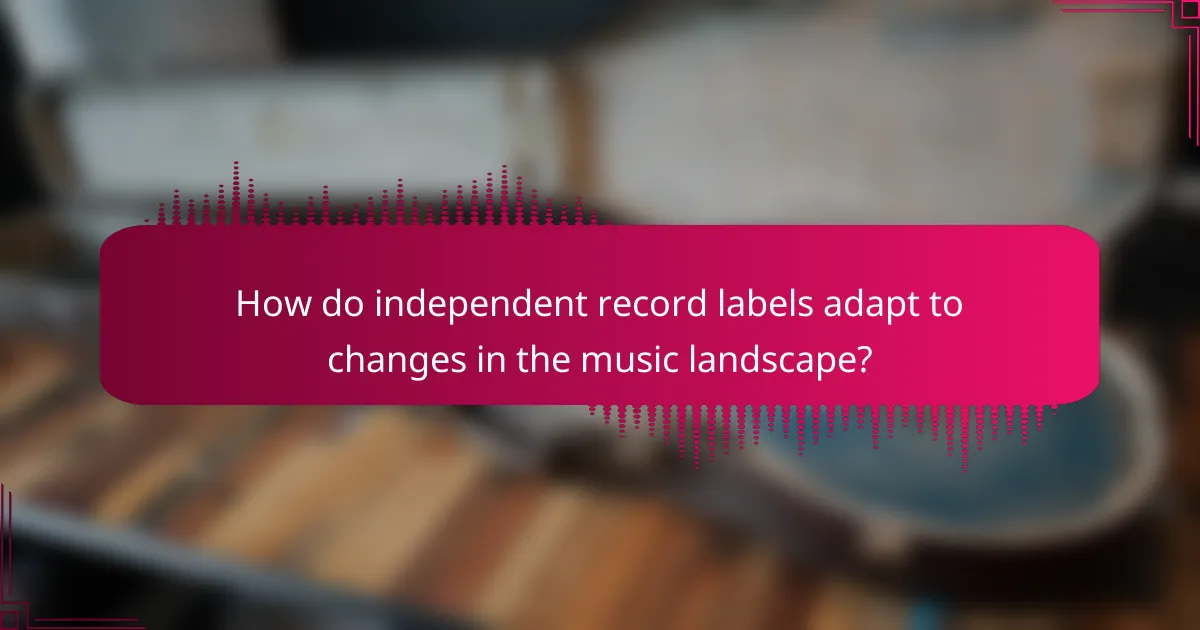
How do independent record labels adapt to changes in the music landscape?
Independent record labels adapt to changes in the music landscape by embracing digital platforms and innovative marketing strategies. They utilise social media for audience engagement and rely on data analytics to understand listener preferences. Additionally, these labels often collaborate with artists to create unique content that resonates with niche markets. By focusing on artist development and maintaining creative control, independent labels can quickly respond to industry shifts, ensuring sustainability and relevance.
What trends are shaping the future of independent labels?
Independent labels are increasingly influenced by digital innovation, artist-driven models, and diverse revenue streams. These trends empower artists, enhance audience engagement, and foster unique sounds. The rise of platforms like Bandcamp and social media allows independent labels to reach wider audiences directly. Additionally, collaborations with brands and incorporation of new technologies, such as NFTs, are shaping their business strategies.
How do independent labels leverage technology for growth?
Independent labels leverage technology by utilising digital distribution platforms, social media marketing, and data analytics. These tools enhance visibility and streamline operations, enabling growth in a competitive music industry. Digital distribution allows independent labels to reach global audiences efficiently. Social media marketing fosters direct artist-fan engagement, building loyal communities. Data analytics provides insights into listener preferences, guiding strategic decisions.
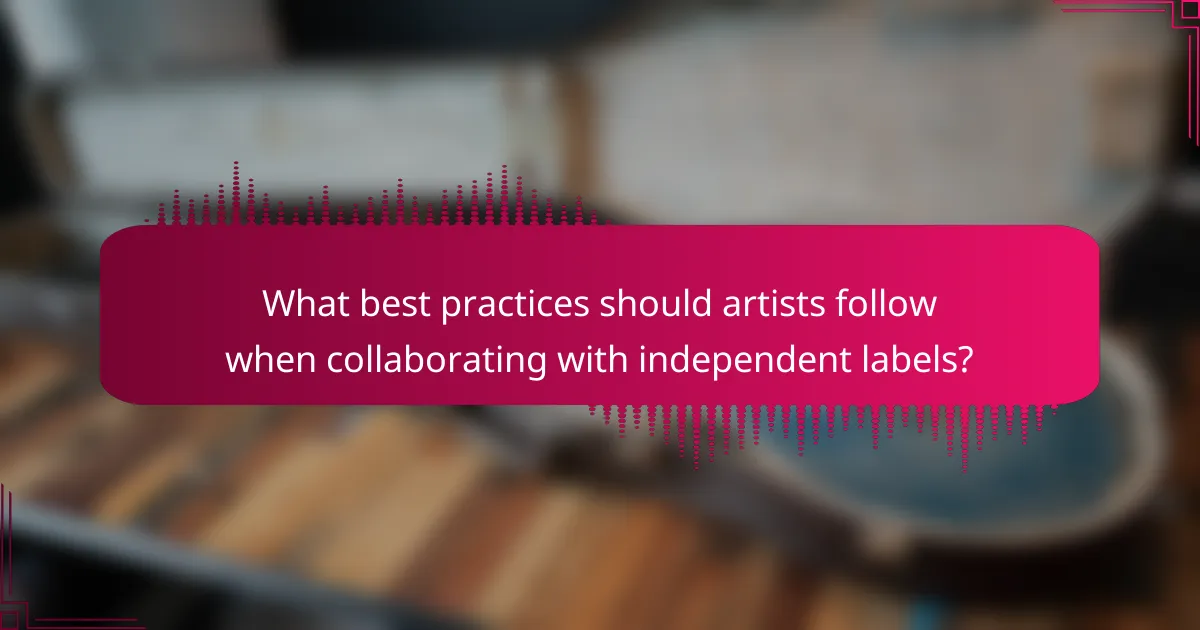
What best practices should artists follow when collaborating with independent labels?
Artists should prioritise clear communication, mutual respect, and shared goals when collaborating with independent labels. Establishing a strong relationship is crucial for successful partnerships.
First, artists must research the label’s vision and values to ensure alignment. This helps in creating a cohesive artistic direction. Second, artists should maintain open lines of communication throughout the collaboration, addressing any concerns promptly. Third, artists must negotiate terms clearly, including revenue splits and creative control, to avoid misunderstandings later.
Additionally, artists should be prepared to adapt and compromise, as flexibility can enhance collaboration. Finally, building a personal rapport with label representatives can strengthen the partnership and lead to more opportunities.
How can artists maintain creative control while working with labels?
Artists can maintain creative control while working with labels by establishing clear agreements and open communication. Independent record labels often prioritise artist autonomy, allowing musicians to shape their sound and vision.
Negotiating contracts that emphasise creative rights is crucial. Artists should seek clauses that protect their artistic integrity and decision-making power. Additionally, maintaining a strong relationship with label representatives fosters collaboration rather than control.
Regular feedback sessions can help ensure that the artist’s vision aligns with the label’s goals. This two-way communication builds trust and leads to a more satisfying partnership. Ultimately, choosing the right independent label that shares the artist’s values enhances creative freedom.
What are effective ways to build long-term relationships with independent labels?
Building long-term relationships with independent labels requires consistent communication and mutual support. Engage in regular dialogue to understand their needs and goals. Collaborate on projects that align with both parties’ interests, enhancing visibility and credibility. Attend industry events to network and strengthen connections. Offer value through shared resources or promotional efforts, fostering a partnership mindset. Establish trust by delivering on promises and maintaining transparency, which cultivates loyalty over time.
What insights can experienced artists share about navigating the independent label landscape?
Experienced artists emphasise the importance of building relationships with independent labels. They suggest researching label histories, understanding their artist roster, and ensuring alignment with personal goals. Networking at music events can provide valuable insights and connections. Additionally, artists recommend clear communication about expectations and creative control. This approach fosters a collaborative environment, enhancing the chances of mutual success.

